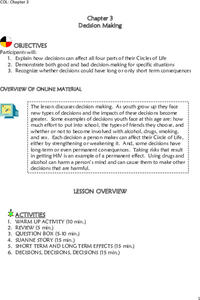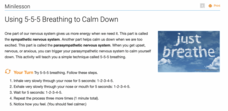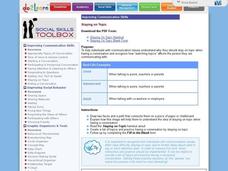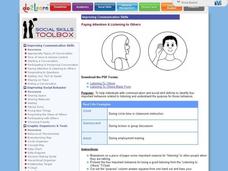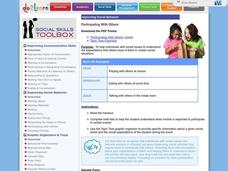Healthy Native Youth
Chapter 3: Decision Making
By way of group discussion, reading, and role-play a series of six activities encourage scholars to make responsible decisions. Following an online introduction, pupils review the concept of volition and answer questions. Middle...
Missouri Department of Elementary
R-E-S-P-E-C-T: A Basic Skill
Imagine seventh graders developing a school wide plan to promote respect in their school. That's the vision behind the second lesson in the R-E-S-P-E-C-T series. In preparation for designing a school-wide media campaign, class members...
Missouri Department of Elementary
I’m A Star!
A lesson encourages scholars to be star community members. Pupils take part in a class discussion that challenges them to brainstorm at least two ways to show responsibility within one's community. Small groups play a game in which...
Missouri Department of Elementary
What Color is Your Apple?
Build your classroom community with an activity that uses apples to examine oneself and their classmates. Participants draw four large apples on blank paper then exchange them within a small group. Group members write a character trait...
Missouri Department of Elementary
Fly Your Kite
Encourage scholars to become a productive community member with a kite-themed lesson. Following a review and discussion, learners complete a Venn diagram that displays the connection between character traits needed to make a home and...
Missouri Department of Elementary
Listening Exercise
Active listening is key to interacting with others in a way that shows respect. To develop their skill as listeners, high schoolers first play the "Telephone Game" to demonstrate some of the problems that arise in communication. Pairs...
Missouri Department of Elementary
Character Clovers
Build a classroom community with a lesson that uses character clovers to examine scholars' roles. Following a whole-class discussion, participants list four roles they play and accompany it with the character traits that go along with it.
Teaching Tolerance
Fairness Fair
How can we create a more fair world? Chances are, class members have some ideas! After reading a text about fairness, individuals create skits around the ideas of fairness. Extend the learning and make their presentations a...
Thoughtful Learning
Using 5-5-5 Breathing to Calm Down
Scholars calm their minds and bodies with a 5-5-5 breathing exercise. Learners breathe in for five seconds, out for five seconds, then wait five seconds to start again. The exercise takes one minute to complete.
Thoughtful Learning
Recognizing Bullying
Boost social awareness with an activity that challenges scholars to recognize bullying. Participants read 10 scenarios and respond after carefully examining behaviors such as body language, facial expressions, and frequency.
Thoughtful Learning
Using Positive Self-Talk
Boost positive self-talk with a chart that turns negative feelings into happy ones. Scholars write down their negative emotions then rewrite them with a positive flair to aid in changing their outlook.
Thoughtful Learning
Doing Random Acts of Kindness
Encourage scholars to perform random acts of kindness. A lesson challenges participants to choose a peer they wish to be kind to without them knowing. Learners list five good deeds and choose one to fulfill. Pupils reflect on the process...
Swiss Agency for Development and Cooperation
Gender and Sport
Serena Williams, Mia Hamm, and Danica Patrick are living proof that women enjoy sports just as much as men. Sports enthusiasts read about the importance of gender equality on the playing field. They discover barriers to participation and...
Bethel School District
Health Triangle Self Assessment
Measure health as a triangle, with each side representing different aspects of health: physical, emotional/mental, and social. High schoolers complete a self-assessment of their health in all three areas before scoring their progress and...
Do2Learn
Communication Board
Help nonverbal individuals navigate a very verbal world with a helpful communication board. After they fill in their name to introduce themselves to others, learners can point to written responses to yes or no questions, as well as to...
Do2Learn
Ending A Conversation
Sometimes beginning a conversation isn't the hard part—it's ending the conversation that can be challenging. Autistic and mainstream learners alike can benefit from a resource that provides a reference handout with ways to end a...
Do2Learn
Staying on Topic
Get from the beginning of a conversation to a successful end with a communication activity. Learners practice staying on topic with a worksheet that prompts them to ask questions and make comments related to the subject of the conversation.
Do2Learn
Waiting Your Turn to Speak
Have you ever been so excited to talk that you interrupted another person? Help young conversationalists wait their turn to speak with a social skills activity.
Do2Learn
Responding to Questions
Why is it important to answer a question? Assist learners with their growing communication skills with an information sheet that explains how questions are meant to gather information.
Do2Learn
Paying Attention and Listening to Others
It's always fun to talk about something you're interested in, but it's just as important to listen to what someone else has to say. Guide class members into becoming stronger listeners with an interactive brainstorming activity.
Do2Learn
Reciprocal Conversation
Keep the conversation going with a social skills activity. Designed for learners with autism, the lesson guides peers through the back-and-forth of a conversation, encouraging them to wait their turn before responding.
Do2Learn
Participating With Others
For learners with autism spectrum disorder, participating with others in a social setting can be stressful and overwhelming. A brainstorming activity prompts pupils to consider the expectations of a particular social occasion, including...
Do2Learn
Respecting the Ideas of Others
Communicating clearly is one part of a successful conversation, but listening to others is just as important. Individuals with special needs plan calm responses and reactions to differing opinions with a collaborative activity.
Do2Learn
Trying New Things
Preparing for a change, big or small, can help learners with autism cope with a potential stressor. A short activity prompts individuals to come up with a plan for an upcoming new experience.


